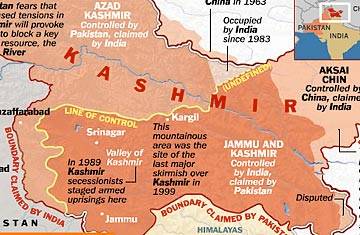The Kashmir conflict: a tale of blood, bravery, struggle, freedom, passion, suppression, and brutality. Everyone knows whose blood is running in the streets, but nobody dares to point out the killer, even though they all know who it is.
Death of humanity. Insensitivity of humans. Blindness of the world. Call it anything, everything is there to see.
When human beings were living in jungles and hunting was the only way to fend for themselves, that time is most commonly known as the age of savagery. Now, looking at what man is doing to man today, I think how much better those savage were who were kind enough to restrict themselves to killing animals, instead of other humans, in their survival and lust for power.
Look at the civilized world of the 21st century. Children, women, and men are being killed for the purpose of gaining power and attaining prestige. The poor souls of the 21st century, we are. Unfortunately.
Let’s come to the point. What is the Kashmir conflict? Who is involved in this entire play? Indians? Kashmiris? Pakistanis? The international community? Who is killing whom and why? What are the implications of this brutality, for both the region and the whole world? Who can resolve this conflict and how? What will happen if this conflict is resolved? What is the Kashmir Conflict’s relevance in the existing global order? And, finally, what is/should be Pakistan’s political position and role in resolving or de-escalating this conflict?
A few days ago, Department of Political Science and Centre for South Asian studies, Punjab University, Lahore organized a two-day National Conference on the topic of “Indian Atrocities in Kashmir: Regional and Global Implications”.
When I came to know about the conference, I started going through different articles, including newspaper pieces and research and policy papers written by professionals and academics. I had so many questions in my mind, and went to attend the conference to seek their answers.
However, I was met with sheer disappointment. Apart from a few exceptions, professors from different universities of Pakistan were doing what TV newscasters and the intellectually shallow are supposed to do. Wishes. Emotions. Irresponsible use of language. Illogical arguments. Baseless allegations. The excessive use of the words “should” and “must” without making any suggestions about policy framework. All of this made things look really odd.
Apart from a few exceptions, the claims of the majority of the scholars can be summarized in the following points:
1. India is committing crimes against humanity in Kashmir.
2. Pakistan has no policy regarding the conflict in Kashmir.
3. Pakistani media is doing very little in highlighting this conflict.
4. Pakistan should support the Kashmiri Freedom Movement.
5. India should resolve the conflict.
6. If this conflict is not resolved, there will be no peace.
This is certainly not what one expects from those who criticize our governments for not being competent and wise enough to formulate useful policies. Most of the things I heard at the conference are already readily available on internet. Google it, and you will find anything and everything.
However, like I said, some exceptions existed. Professor Rasul Baksh Rais, for example, who spoke at the end, silenced all those who were alleging that Pakistan has no policy regarding the Kashmir Conflict. “Pakistan has a Kashmir policy,” he argued, “Just go and read it again”.
I, being a student of politics, personally think those who were speaking against the media should watch news channels at least for one hour every day.
The irony is that some speakers were trapped in Wikipedia’s first sentence: “The Kashmir conflict is a territorial conflict primarily between India and Pakistan, having started just after the partition of India in 1947.”(https://en.wikipedia.org/wiki/Kashmir_conflict) Is this the truth? No?
I expected to register my lamentations about the Kashmir Conflict when I picked up this topic, but, instead, ended up crying over our own intellectual crisis. Let me remind the readers that, last year, the same department organized a national conference on the topic of “Challenges of Peace Building in South Asia”. And, I in my blog about the said conference, commented that “The scope of most of the papers, read in the conference, was limited and myopic. We, therefore, failed to develop a comprehensive and workable strategy to at least lessen tensions between Pakistan and India. However, there were some pieces of advice for both countries in terms of “should do so” and “should not do so”.” (http://nation.com.pk/blogs/29-Nov-2015/peace-building-in-south-asia-when-will-we-move-from-the-should-to-the-how) The sad truth is that things are still the same. Quite the same.
This conference reminded me of Pervez Hoodbhoy’s article “Enough PhD’s, thank you”. (http://www.dawn.com/news/1221057)
My humble request to all Pakistani universities professors is: do not speak if you are not well-prepared. Do not copy others. Just present what you have in your mind. And, governments will involve you in the decision-making process once you stop talking about the shoulds and musts. Let’s come and discuss political policy matters in a broader framework of global politics within a realistic paradigm. Words can be stolen but politics will always remain original, my dear innocent fellows. Please, grow up!
Note: We need to read some good books, research articles, and UN resolutions before presenting our original thought over this – or any other – political issue. Only then then will we be able to discuss and present some solutions regarding the discussed conflict. Speaking before doing our homework is only a wastage of time – ours and others’.






